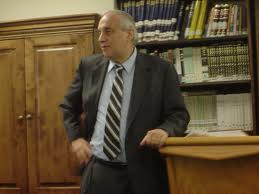
Just a few days after my blog post from last week ran, the Israeli rabbinate decided that it would, indeed, accept Rabbi Avi Weiss’ testimony as legitimate for people he vouched for as Jewish. This is a step in the right direction for the Israeli rabbinate, which had previously called Rabbi Weiss’ validity into question following his controversial moves in the American Orthodox world.
The response to the Rabbinate’s calling Weiss’ validity into question caused a small firestorm in the Jewish blogosphere, and the rabbinate’s decision to rule, ultimately, in favor of Weiss’ validity caused a similar flurry of responses and interpretations.
While the Rabbinate’s questioning Weiss’ validity as an Orthodox rabbi does highlight a growing disparity between the American-Jewish leadership and the Israeli Rabbinate, this is symptomatic of a larger, and, so far, successful effort within the Jewish world to push the rabbinate to see past its centrist Orthodox boundaries and to begin to draw non-Orthodox communal leaders into its folds. This began when the Israeli Ministry of Culture and Sport (if not the Ministry of Religion) decided last spring to pay the salaries of four Reform rabbis like they pay Orthodox rabbis. In so doing, the Israeli government is taking the first steps toward legitimizing those Jews who fall to the religious left of the Orthodox community.
The Rabbinate, it seems, is realizing that it is becoming increasingly irrelevant in the lives of the vast majority of Jews, who are not Orthodox. And, instead of trying to tighten their control over Jewish life by restricting the opportunities of non-ultra-Orthodox Jews, the Rabbinate is trying to reconcile themselves to those Jews who feel disenfranchised by the Rabbinate — and, by extension, the policies of the Israeli government as a whole, as American Jews in particular are becoming increasingly vocal in their opposition to its policies.
This, hopefully, is a wake-up call to the religious leaders of American Jewry. The Rabbinate is sending the message, at least implicitly, that it is starting to warm up to the idea of engaging in dialogue with those to its religious left. Whether or not this discussion will be a productive one is primarily up to the American-Jewish leadership’s liberal streams continuing to push for the Rabbinate’s recognizing them as legitimate.
As fellow New Voices contributor Jonathan Katz noted in a piece last week, American Jewry has done a very good job of instilling pride in Jews without the help of the Israeli government or the Rabbinate, and the Rabbinate is trying to remain a relevant religious institution among Diaspora Jews who realize that their Jewish identity is tied to much more than their connection to the Modern State of Israel. To be sure, Zionism is still a large part of Jewish identity today (and I would be remiss if I did not say that it is a large part of my Jewish identity, too), but the two can also be separated. The vast majority of my religious practices, for example, are not particularly informed by my Zionism, save the prayer for the State of Israel that I recite during Saturday morning services.
The Israeli Rabbinate, even if reluctantly, has made the first move. Now, it is upon the religious leaders in the Diaspora to realize that the opportunity is theirs for the taking. They can, and should, build upon Rabbi Weiss’ victory and continue pushing the Israeli Rabbinate, and make their presence — and their influence — known.
Diaspora Jewry (along with Israeli Jewry) is not composed solely of Orthodox Jews, but it seems that matters of religious observance have always been measured up to Orthodox standards, as proven by the fact that an Orthodox rabbi is the only one who is able to prove a person’s Jewishness to the Rabbinate. I, as someone who grew up Orthodox, and, for the most part, still adheres to Modern Orthodox philosophies, see this as an issue that liberal religious leaders now have an opportunity to fix. If they measure themselves up to the standards that the Orthodox have set up, they are not only failing to assert their own power as leaders who represent the vast majority of American Jews, but are also sending the implicit message that they are, somehow, less legitimate as Jews because they fail to pass the Rabbinate’s muster. Now, they have the opportunity to change that perception.
As the Rabbinate now starts to loosen its grip on what it means to be a Jew, those religious leaders who fall to the left of the Rabbinate on the religious spectrum have the opportunity to assert themselves as the representatives of the vast majority of American Jewry. It is up to them to show that they have an equally legitimate share in Jewish life, and to break up the monopoly held by the Rabbinate. The Rabbinate is starting to realize just how out of touch it is with the Jewish community, and it is now upon those previously disenfranchised by the Rabbinate to build upon Rabbi Weiss’ victory, and to work toward a more inclusive religious Jewish community in Israel.
Amram Altzman is a student at List College, a joint program between the Jewish Theological Seminary of America and Columbia University.
